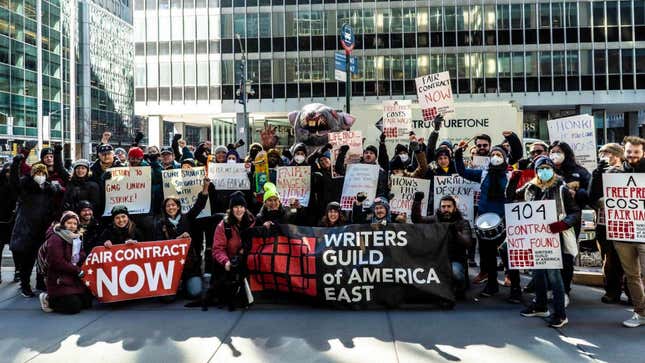
So that just happened.
You probably saw that Kotaku and five of its sister publications, all owned by G/O Media, went on strike last Tuesday, March 1. This week, we’ve returned. It’s great to be back.
Striking for a better contract was quite an experience, and I got a front-row seat thanks to being on the Union’s bargaining committee.
Two years ago, I wouldn’t have known what a bargaining committee was. I was firmly pro-union, sure, but I’d never had the chance to actually be in a union, to see one in action, until joining Kotaku.
But even then, I didn’t really get it. The Gizmodo Media Group Union, organized by The Writers Guild of America, East, took a little fee out of each paycheck, and I got invited into a special Slack just for Union business.
Not much seemed to happen there. I got the impression some coworkers didn’t even check it regularly. It mostly became a place to say goodbye to beloved colleagues when they left the company, a distressingly frequent phenomenon over the last two years. It was hard to blame them: Working conditions at G/O Media often felt difficult, and pastures seemed far greener elsewhere.
But Union Slack slowly roused from its slumber over the last few months. The contract governing our publications’ relationship to G/O Media was due to expire on February 28, you see. And that’s where the bargaining committee came in.
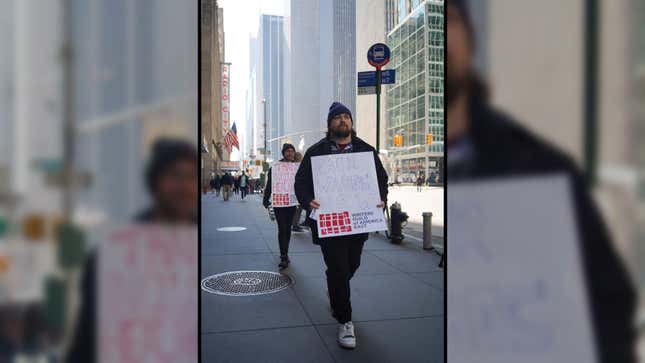
The committee’s job was to figure out what rights and protections we, meaning all the members of the GMG Union, wanted to enshrine in a new contract that would hopefully go into effect on March 1. (Check out the GMG Union website’s archived front page to see where we landed.) And then—with the expert guidance of a seasoned Writers Guild negotiator and our Writers Guild business agent—we had to actually negotiate with representatives from G/O Media, who would be advocating for the company’s interests, to come out with a final contract that both sides could agree to.
Without going into details, talks didn’t lead to an agreement before the deadline. Time ran out, and we saw no evidence that granting the company an extension would inspire it to be more generous. So the Union voted to go on strike, starting March 1.
I and two other bargaining committee members gladly took the Union up on its offer to bring us out to New York from our home states so we could better participate in the strike and, hopefully, future negotiations.
Come Tuesday, Kotaku’s front page lay fallow, as we had stopped producing content. (We asked readers to stop visiting as well, to avoid crossing a digital picket line.) But if you were on the street outside G/O’s headquarters near Times Square, you’d have seen a raucous crowd of Kotaku, Jezebel, The Root, Gizmodo, Lifehacker, and Jalopnik staffers—no, workers—raising hell and broadcasting their demands to the world through direct action.
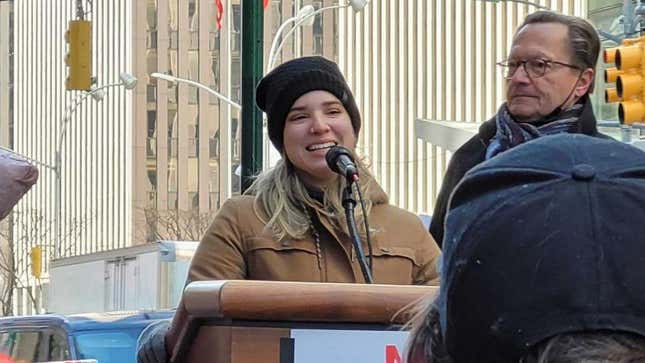
We carried homemade signs, chanted union slogans, banged makeshift drums, handed flyers to passersby, and kept beat with a tambourine. Marching in a circle for hours on end in near-freezing weather proved to be surprisingly hard work. After my first full day picketing, having racked up nearly 20,000 steps, I ached like I’d just hit the gym for the first time since the pandemic began. (In fact, that particular milestone has not occurred yet.)
But the street only told half the story. Back on Slack, dozens of my coworkers, many scattered around the country, organized themselves to get our message in front of as many people as possible. Bargaining committee members ran the GMG Union Twitter and created a website, Kotaku started Twitch streaming, others created TikToks and Instagram posts and stories, made art, solicited reporters, scheduled media appearances, researched the opposition, organized a GoFundMe to take care of the many workers suddenly going unpaid…
It was incredibly inspiring to see what 80-odd individuals, organized as a group, were capable of achieving. To feel the mutual respect and caring of workers, many of them newly awakened to their many commonalities, demonstrated through words and deeds alike. I think, as is said, consciousnesses were raised. I know mine was.
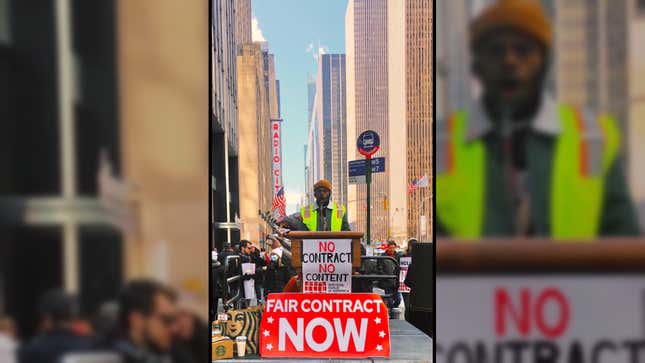
Tuesday, Wednesday, Thursday we picketed. On Friday, we planned to hold a rally. Strangely, the day before, G/O announced that late-breaking construction would close the office on Friday, and that everyone should work from home. No matter, the show had to go on, and with a stage, loudspeakers, and passionate speakers advocating for our cause, we made plenty of noise.
A little into the speaking part of the rally, a wonderful thing happened. Our WGAE union negotiator Arcy rushed onstage to interrupt the speaker and make an announcement: The company wanted to resume talks with the bargaining committee, effective immediately.
Direct action gets results. If you take nothing else from this article, take that.
The rest is just more details. We bargained into the night, made a lot of progress in bringing both sides together, but reached an impasse by one in the morning. They wouldn’t budge on minimum salaries and several other key demands. It looked like we’d be hitting the picket line again on Monday, but as our lead negotiator reminded us, a lot can happen in 48 hours.
On Saturday, the Union continued planning its next escalation campaign—we had some interesting tactics in the works, including a field trip to Boston, where our parent company Great Hill Partners resides—but around 10 a.m. on Sunday came an unexpected message. The company was offering a settlement package that largely fulfilled the key asks we were prepared to continue striking for. Acceptance was contingent on the unit returning to work on Monday.
You’ll have noticed we’ve returned to work.
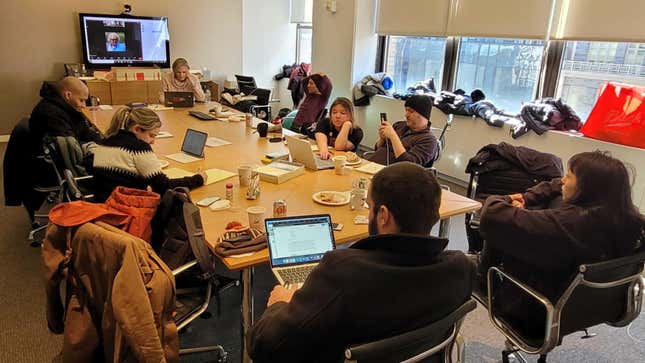
While I can’t speak for everyone in the Union, I think most of us are quite pleased with the new contract. You can read specifics of what we won on the GMG Union website, but suffice it to say we just made significant strides toward making G/O Media a better place for editorial creatives to do their work.
If Gawker had never organized in 2015, when it joined with Writers Guild of America, East to form the first-ever union shop of digital media workers, we would not have been able to so successfully advocate for our rights last week (and make a little history ourselves by launching the first open-ended strike by a digital media shop). When the “free market” leaves workers in the lurch, unions pick up the slack.
So that’s what we did last week, a week that also saw the 100th (and counting) Starbucks location petition for union recognition, Major League Baseball players continue to bargain, New York-area REI workers form that retail chain’s first-ever union, Hershey’s chocolate workers holding a union vote, and The New York TImes’ tech workers announcing the successful organization of their own ranks. I’m pleased we were able to participate in the emerging narrative of organized labor’s resurgence in the United States and proud of my editorial colleagues across the unit, whose solidarity was only matched by their discipline, camaraderie, and good humor.
And, of course, thanks must go to those of you, our readers, who respected our digital picket line, sent words of encouragement, and contributed to our (wildly successful!) strike fund. Thank you very much.
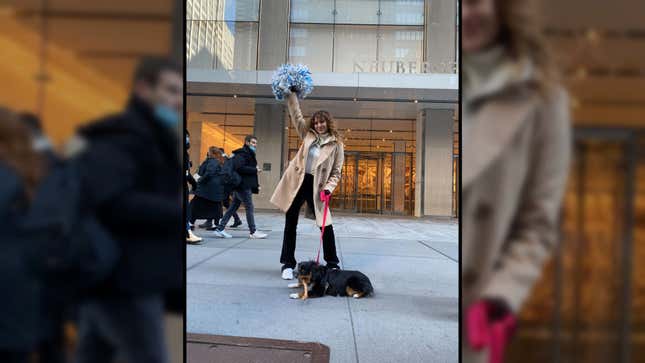
There’s an old union saying that a win for one is a win for all, so we hope the events of this past week inspire other workers, especially in games and media, to more closely examine the conditions under which they labor and better understand the substantial power they possess when they organize to act collectively.
The games industry in particular is an extremely abusive space, which has only become more evident with the last year’s disturbing disclosures from Ubisoft, Activision Blizzard, Riot Games, and other major companies. Labor organizing is one potentially potent remedy for such maladies. As such, Kotaku will continue to stand in solidarity with pioneering groups like ABK Worker’s Alliance, which is fighting to right the wrongs of those in power at Activision Blizzard and create a better future for all of its workers.
A better, more humane games industry is possible, yet the bosses lack both the will and the incentive needed to make that a reality. But if workers across the industry recognize their common interests and begin to act collectively, real progress would finally be within reach. So what are we waiting for?